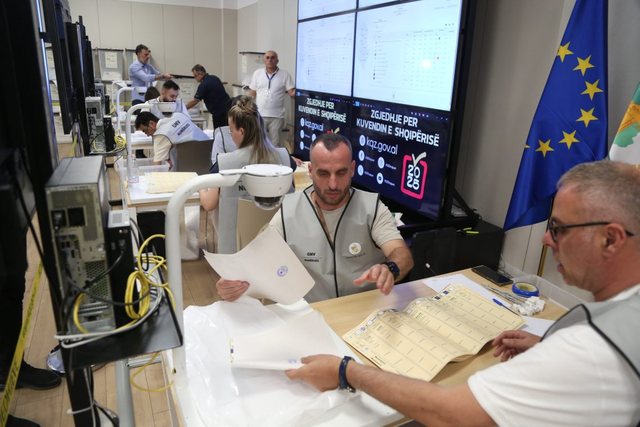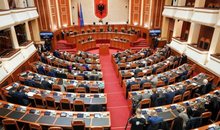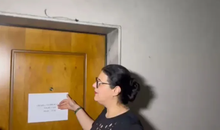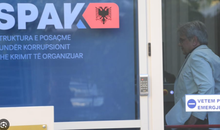
 Flash News
Flash News
Powerful explosions in Tel Aviv and Jerusalem, Iran attacks with over 100 missiles
Car catches fire in Bulqiza, driver and passengers rescued
Fire in Berat, a bushy area is engulfed in flames
Albanian immigrant pulled them out of the river, the two children couldn't make it out, they suffered clinical death
SPAK would present the bimonthly report on the investigations against Veliaj, the hearing at the GJKKO is postponed
BIRN: Opening the ballot boxes could bring new consequences for the integrity of the electoral process

The Central Election Commission recounted 42 ballot boxes in the Dibër district on Wednesday based on a complaint by the democratic candidate, Xhemal Gjunkshi, alleging that the counters had misappropriated the preferential vote.
At the end of the recount, the difference between him and the candidate Përparim Spahiu, ranked ahead of him on the DP's preferential list, narrowed from 120 votes to 54 votes, confirming his claims and why he did not change his ranking in the final.
These are the first data from a long recount process that has just begun and will include several districts following decisions taken by the Appeals and Sanctions Commission, KAS, to reopen the ballot boxes.
The preliminary results of the May 11 parliamentary elections, which gave the Socialist Party another governing mandate with 83 MPs, a much higher majority than the previous three mandates, are being widely contested by the main opposition coalition, the Democratic Party-Alliance for a Greater Albania, other smaller parties, and open-list candidates.
The complaints filed with the CEC raise allegations of irregularities in the voting and vote counting process.
So far, KAS has decided to recount all ballot boxes in the Tirana and Fier regions, in several voting centers in Durrës, as well as the preferential votes of candidates in Dibër.
In Tirana, the PD-ASHM coalition hopes to win the 14th mandate in parliament, a race between the Democratic candidate, Ilir Alimehmeti, and the second candidate on the list of the Mundësia party, Erald Kapri, who emerges as the winner. However, the recount may result in other scenarios related to the preferential vote within the majority, where Blerina Gjylameti lost the mandate by a handful of votes to Olta Xhaçka, but withdrew from the contest after being “pulled by the ear” by Prime Minister Edi Rama.
In Fier, the Albania Movement is hoping to win a mandate and is battling with the Socialist Party. In the Durrës district, the ASHM candidate is Aulon Kalaja, who, like Gjunkshi, has raised allegations of manipulation of preferential votes within the party.
While recounts may bring negligible changes to the final results, experts warn that this process will be a gauge for the integrity of the election administration, which could bring criminal consequences for commissioners and counting teams if irregularities are found, and prompt new electoral reform.
Erida Skëndaj, drejtore e Komitetit Shqiptar të Helsinkit, i tha BIRN se “integriteti i zgjedhjeve cenohet nëse nga rinumërimi vërehen rezultate të ndryshme që janë substanciale në diferencat midis subjekteve zgjedhore apo kandidatëve, dhe që dukshëm kanë avantazhuar në rezultat njërën apo tjetrën palë, pra nuk janë thjeshtë gabime minimale njerëzore në rinumërim”.
Për rrjedhojë, shton ajo, “kjo do përforconte urgjencën më së pari në reformën e ardhshme zgjedhore, të depolitizimit të administratës zgjedhore në të gjitha nivelet, paralelisht me çështje të tjera thelbësore që janë objekt ankimi nga subjektet/kandidatët”.
Edhe drejtuesit e dy organizatave të tjera që monitorojnë procesin zgjedhore, Qendresa Qytetare dhe Instituti i Studimeve Politike, e shohin procesin e rinumërimit si një proces që do të nxjerr në pah nevojën për një reformë zgjedhore për një administrim apolitik të procesit.
Afrim Krasniqi nga Instituti i Studimeve Politike nuk beson se do të ketë pasoja në ndarjen e mandateve nga ky proces, por do të ketë pasoja të tjera. “Pritshmëritë janë të pakta, sepse u bënë disa procese zgjedhore që vota devijohet përpara votimit, jo në ditën e votimit apo në numërim,” i tha ai BIRN, ndërsa shton se “nëse ka devijim qoftë edhe një vote, individët përgjegjës duhet të përballen me pasojat e ligjit”.
Edhe Rigels Xhemollari, drejtor ekzekutiv i “Qëndresa Qytetare” beson se, “nëse hetimi i parregullsive që mund të konstatohen do të thellohet realisht, mund të çojë në pasoja penale për shumë komisionerë që kanë abuzuar me detyrën”.
“Po aq e rëndësishme është edhe krijimi i precedentëve të rrezikshëm si trafikimi i votës apo transferimi i saj, që mund të përdoren për të justifikuar kalimin drejt një procesi totalisht elektronik në vitin 2027 apo 2029,” shton ai.
Nga ana tjetër, Xhemollari mendon se fokusimi i opozitës tek kontestimi i rezultateve, “në vend që të forcojë kauzën për integritetin zgjedhor, rrezikon ta delegjitimojë betejën e opozitës dhe të kthejë farsën elektorale në një justifikim të brendshëm për të mos pranuar realitetin”.
“Në fund, ky debat i shërben vetëm qeverisë: për të kaluar ligje dhe akte abuzive pa zhurmë, pa debat dhe me konsensus në heshtje,” thekson Xhemollari.
Kodi Zgjedhor, i cili ka pësuar disa herë ndryshime ndër vite është formuluar në bazë të një administrimi bipartizan të gjithë procesit zgjedhor, që nga përbërja e Komisionit Qendror të Zgjedhjeve, Komisionet Zonale dhe deri tek grupet e numërimit të votave.
Pavarësisht rekomandimeve të përsëritura nga organizmat ndërkombëtarë, OSBE-ODIHR që monitorojnë proceset zgjedhore, për të krijuar një administrim zgjedhor apolitik, partitë kanë këmbëngulur të vijojnë të mbajnë kontrollin mbi procesin, duke treguar mosbesimin e tyre tek një administratë zgjedhore e paemëruar nga partitë.
Afrim Krasniqi fokusohet tek kjo problematikë duke sjellë në vëmendje se Shqipëria është vendi i fundit në Europë që operon me këtë sistem administrimi politik të zgjedhjeve.
"We are dealing with a process in which the parties themselves admit that the practice of bipartisan election administration has failed, with the SP ordering candidates to withdraw their complaints and the DP allowing them," he says, while suggesting finding other, more reliable and effective mechanisms.
He also mentions another aspect of the vote recount process, suggesting that its financial costs be paid by the electoral entities. “It makes no sense for citizens to pay millions of euros for party commissioners and counters and then for their control, i.e. the recount of votes by party counters,” Krasniqi concluded. Reporter.al
Latest news


Israel confirms US support for the neutralization of missiles by Iran
2025-06-13 22:37:44

Foods you should avoid after your 40s for health
2025-06-13 22:05:07
Possessive and toxic, get to know the 3 most jealous signs of the horoscope
2025-06-13 21:51:58
Poland: A Russian plane violated our airspace!
2025-06-13 21:40:15



Tragedy in Kurbin/ Fire engulfs pig barn, 450 pigs burned alive
2025-06-13 20:40:44
Xixho: Without functional democracy, EU integration remains an illusion!
2025-06-13 20:27:45

UN: Gaza aid group has failed in its mission
2025-06-13 20:04:32

BIRN: Half of Albanians have a gross salary of less than 62 thousand lek!
2025-06-13 19:31:41
Revenge warned/ Iran raises red flag over mosque, consequence of Israeli attacks
2025-06-13 19:23:10
Albanian man killed in metro station, two Englishmen found guilty
2025-06-13 19:08:41
How recommended is a midday nap for health?
2025-06-13 19:01:58

Serious in Italy/ Albanian stabs 23-year-old in Ravenna, escapes on motorcycle
2025-06-13 18:18:57
Car catches fire in Bulqiza, driver and passengers rescued
2025-06-13 17:59:20

Attacks on Iran/ Tirana-Tel Aviv flights canceled, embassy closed
2025-06-13 17:35:45
Apple warns again: Don't sleep with your iPhone while charging!
2025-06-13 17:20:31
Albanian youth raped worker in Greece, surrenders to police (NAME)
2025-06-13 16:59:50
Plenary session in the Parliament on Monday, what will be discussed?
2025-06-13 16:42:10


Fire in Berat, a bushy area is engulfed in flames
2025-06-13 16:06:18



Israeli attacks, Trump calls on Iran: A deal must be made, before it's too late
2025-06-13 15:19:21

Israel's attacks on Iran raise oil prices worldwide
2025-06-13 14:56:37
The Kosovo Assembly is not constituted even in the 31st attempt
2025-06-13 14:41:24
Euro hits 'bottom', European currency drops to new historic low
2025-06-13 14:30:28
First outbreak of small cattle plague confirmed in Korça
2025-06-13 14:19:51
Kiara Tito "in mourning", experiences great pain: I will always miss your voice
2025-06-13 14:13:47


Trump warns Iran to accept nuclear deal before 'even more brutal' attacks
2025-06-13 13:55:25
Iran appoints new commanders after Israel kills military leaders
2025-06-13 13:39:28



Maliq farmers protest
2025-06-13 13:03:07
KAS accepts the DP's request, decides to recount the votes in Gramsh and Peqin
2025-06-13 12:46:14



Bennett who sealed the political "deflowering" of SPAK
2025-06-13 12:21:27
Lied to FBI about Charles McGonigal's connections, Former Diplomat Pleads Guilty
2025-06-13 12:10:56

The strange world of justice
2025-06-13 11:55:10
SPAK reports today to the GJKKO the two-month investigation into Erion Veliaj
2025-06-13 11:39:30

40-year-old arrested for stealing hospital employees' bags
2025-06-13 11:21:09


Tabaku: We cannot behave like Europeans in Brussels and like autocrats in Tirana
2025-06-13 10:49:00
International Atomic Energy Agency: Iran's main nuclear plants not hit
2025-06-13 10:36:12
AMP punishes three "Eagles" officers, suspends them from duty
2025-06-13 10:28:13


Flights in the Middle East canceled after Israeli airstrikes on Iran
2025-06-13 09:53:02
Halit Valteri appears in SPAK, why was he summoned?
2025-06-13 09:39:50


These Horoscope Signs Will Have Lots of Luck During the Summer
2025-06-13 09:13:00



What are Iran's nuclear ambitions and why are they so controversial?
2025-06-13 08:38:03
Donald Trump convenes cabinet after Israeli attacks on Iran
2025-06-13 08:24:44
Foreign exchange, the rate at which foreign currencies are sold and bought
2025-06-13 08:16:58
Albanian investments abroad slowed down in the first quarter of the year
2025-06-13 08:06:34
Çfarë ndodh në organizëm nëse hani një thelpi hudhër në darkë
2025-06-13 08:00:48
Israel attacks Iran, targets nuclear plants and military commanders
2025-06-13 07:46:14
Temperatures up to 36 degrees, as the weather forecast for today
2025-06-13 07:33:10
Horoscope June 13, 2025, what the stars predict
2025-06-13 07:15:37
Morning Post/ In 2 lines: What mattered yesterday in Albania
2025-06-13 06:59:27
Car goes off the road on the "Tirana-Lezha" axis, 4 injured
2025-06-12 23:03:47

Document/ Benet Beci was taken into custody by SPAK before the elections
2025-06-12 22:52:12








Montenegrin Army to train Ukrainian soldiers
2025-06-12 20:13:45
Italia në alarm, zgjebja po përhapet me shpejtësi
2025-06-12 20:11:39

Dua Lipa gets engaged: I'm happier than ever with Callum Turner
2025-06-12 19:44:29

Around 29,000 Albanians left last year, INSTAT estimates
2025-06-12 19:31:23
